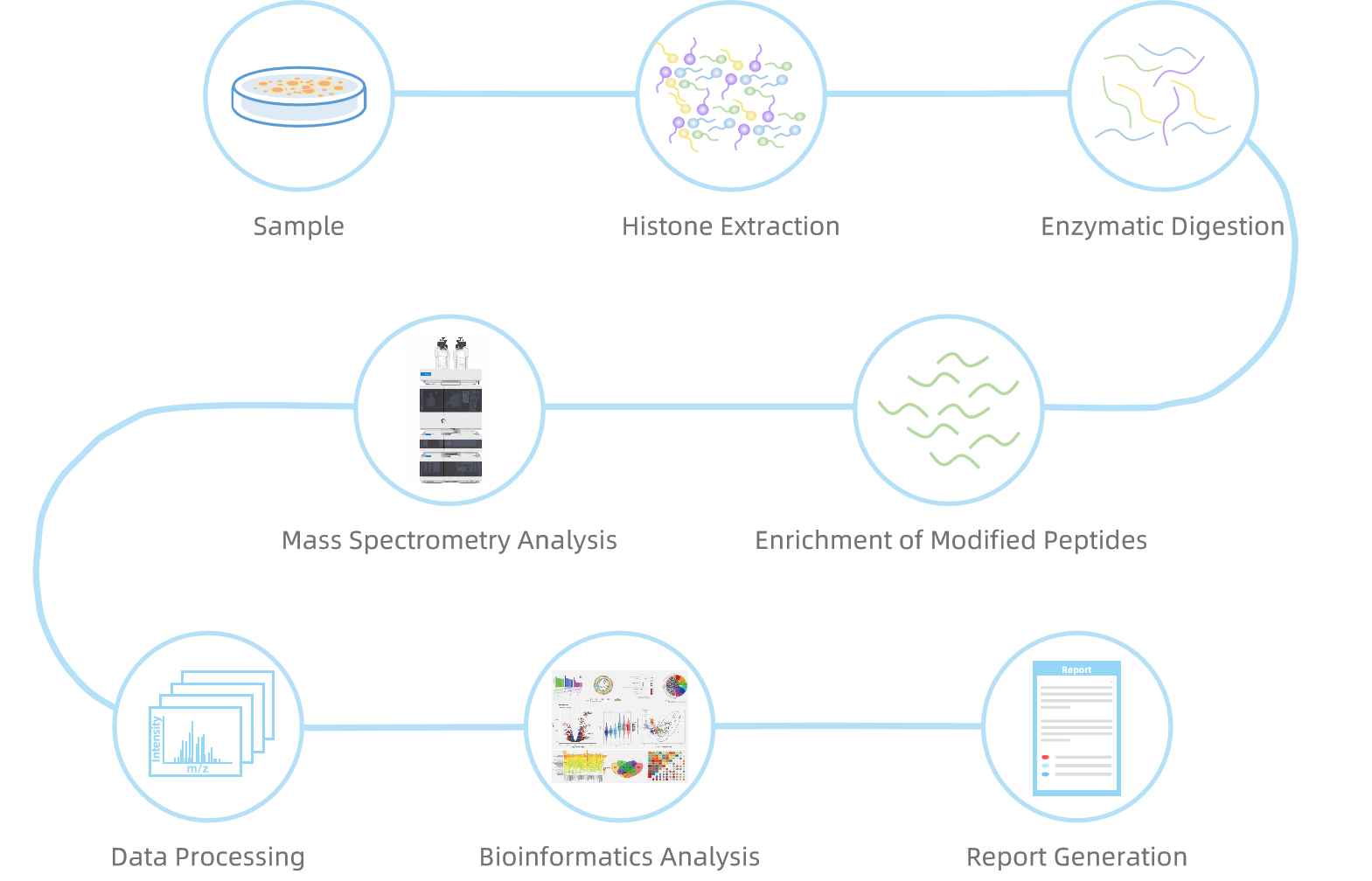Histone Propionylation Analysis
- Animal tissue ≥ 2 g
- Plant tissue ≥ 0.4 g
- Serum / Plasma ≥ 2 mL (plasma should be collected using EDTA as an anticoagulant)
- Urine ≥ 10 mL
- Cell ≥ 1 x 10⁸ cells
- Yeast / Microbial samples ≥ 0.4 g
- Protein samples: 2-5 mg (Standard tissue or cell lysis buffers can be used during protein extraction)
Histone propionylation is a significant post-translational modification characterized by the addition of a propionyl group to the lysine residues of histone proteins. This modification is a key regulator of chromatin structure and function, playing a crucial role in vital biological processes such as metabolic regulation and cellular stress responses. Initially identified on histones, lysine propionylation has since been observed in various other proteins, underscoring its broader implications in cellular physiology.
The enzymatic substrate for histone propionylation is propionyl-CoA, which is metabolized by propionyl-CoA carboxylase in the cell. Elevated levels of propionyl-CoA can lead to increased histone propionylation, thus influencing gene expression and chromatin dynamics. Histone propionylation is generally associated with active chromatin, acting as a marker for transcriptionally active regions of the genome. Notably, in conditions such as propionic acidemia—an autosomal recessive metabolic disorder characterized by elevated propionyl-CoA levels—there is a corresponding increase in protein propionylation, which may contribute to the pathology observed in these patients. Current research is actively exploring the implications of histone propionylation in the regulation of gene expression and its interactions with other post-translational modifications, such as acetylation and methylation. These interactions are critical for maintaining chromatin integrity and orchestrating complex cellular responses.
Services at MtoZ Biolabs
MtoZ Biolabs utilizes Thermo Fisher's Q Exactive HF, Orbitrap Fusion, and Orbitrap Fusion Lumos mass spectrometry platforms, in combination with Nano-LC, to provide a comprehensive solution for histone propionylation analysis. Simply provide your experimental objectives and send us your samples, and we will offer you a one-stop service from sample preparation and MS analysis to data analysis, delivering detailed identification and quantitative analysis of histone propionylation modifications and their modification sites.
Compared to traditional proteomics analysis, the key to histone modification analysis lies in the isolation and purification of histone components, as well as mitigating the impact of N-terminal lysine on the analysis of histone post-translational modifications. Since histones are located in the cell nucleus, MtoZ Biolabs has developed a specialized platform for histone extraction and purification, drawing on existing literature and experimental experience. Cells are homogenized and subjected to low-speed centrifugation to obtain the nuclei. The nuclei are then further disrupted to release histones and DNA. High-salt buffer is used to remove impurities, and High-Performance Liquid Chromatography (HPLC) is employed to separate different histone components, achieving optimal purity for subsequent mass spectrometry analyses. Additionally, to eliminate the impact of N-terminal lysine, we utilize 2-3 different enzymes to enhance peptide coverage in mass spectrometry analysis during the digestion process. This multi-enzymatic digestion increases the coverage of histone peptides, preventing the loss of post-translational modification information due to unsuitable peptide lengths or low ionization efficiency.
Analysis Workflow

Service Advantages
1. Advance Analysis Platform
Mtoz Biolabs established an advanced histone propionylation analysis platform, guaranteeing reliable, fast, and highly accurate analysis service.
2. One-Time-Charge
Our pricing is transparent, no hidden fees or additional costs.
3. High-Data-Quality
Deep data coverage with strict data quality control. AI-powered bioinformatics platform integrate all histone propionylation analysis data providing clients with acomprehensive data report.
4. Optimized Extraction
An optimized histone extraction and purification protocols are employed to minimize contamination and ensure high purity.
Sample Submission Requirements
1. Sample Volume
2. Sample Preservation
Samples should be shipped with dry ice. Avoid repeated cycles of freezing and thawing
Note: We will conduct testing on the provided samples. The formal experiment will commence only after the samples pass the quality check.
Deliverables
1. Comprehensive Experimental Details (Materials, Instruments, and Methods, etc.)
2. Relevant Liquid Chromatography and Mass Spectrometry Parameters
3. Detailed Information on Histone Propionylation Analysis
4. Raw Data
5. Mass Spectrometry Image
6. Custom Analysis Report
MtoZ Biolabs, an integrated Chromatography and Mass Spectrometry (MS) Services Provider, provides advanced proteomics, metabolomics, and biopharmaceutical analysis services to researchers in biochemistry, biotechnology, and biopharmaceutical fields. Our ultimate aim is to provide more rapid, high-throughput, and cost-effective analysis, with exceptional data quality and minimal sample consumption. If you are interested in our histone propionylation analysis services, please feel free to contact us. We are dedicated to providing you with the best service.
How to order?







